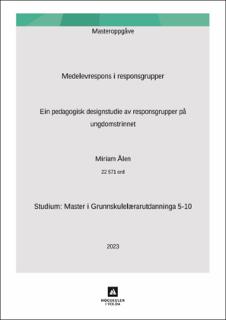Medelevrespons i responsgrupper. Ein pedagogisk designstudie av responsgrupper på ungdomstrinnet
Master thesis
Permanent lenke
https://hdl.handle.net/11250/3081547Utgivelsesdato
2023Metadata
Vis full innførselSamlinger
Sammendrag
Denne masteroppgåva undersøkjer medelevrespons i responsgrupper som ein del av ein skriveprosess i norskfaget. Føremålet med oppgåva er å undersøkje kva moglegheiter og utfordringar det er for læraren når ein arbeider med medelevrespons i responsgrupper.
For å undersøkje temaet byggjer studien på eit kvalitativt forskingsdesign og på pedagogisk designforsking (Bjørndal, 2013). I pedagogisk designforsking utarbeider forskaren eit undervisningsopplegg basert på teori om det ein forskar på. Deretter prøver aktørane (lærar og elevar) ut undervisninga medan forskaren observerer. Til slutt reflekterer forskaren og aktørane saman over undervisningsopplegget. I denne studien har eg utforma eit undervisningsopplegg med responsgrupper som ein lærar og hennar aldersblanda klasse har testa ut. I etterkant blei det gjort intervju med læraren og tre av elevane. Datamaterialet som ligg til grunn er feltnotat og lydopptak frå observasjon, lydopptak frå lærar- og elevintervju og elevar sine refleksjonsnotat.
Funna viser at det er mange moglegheiter og utfordringar knytt til arbeid med responsgrupper. Utfordringane byggjer i stor grad på elevane sin manglande og varierande responskompetanse. Det kjem fram at elevane treng eksplisitt opplæring for å kunne gi god respons og at det er noko ein må jobbe systematisk med over tid. Om ein tek seg tid til det og gir elevane gode verktøy, vil ein truleg få mykje igjen for det på lang sikt. Det handlar om moglege moglegheiter i responsgrupper som samarbeidslæring gjennom observasjon og dialog, innlæring av vitskapelege omgrep og etablering av sosiale og faglege fellesskap. Abstract
This master’s thesis explores peer response in peer response groups as a part of a writing process in the subject Norwegian. The purpose of the thesis is to examine what possibilities and challenges the teacher faces while working with peer response in peer response groups.
To examine the topic the study builds on qualitative research method and design-based research (Bjørndal, 2013). In design-based research the researcher develops a teaching plan based on theory about the topic they examine. Thereafter the participants (teacher and pupils) try out the teaching plan while the researcher observes the situation. In the end the researcher and the participants reflect over the teaching situation. In this study I have developed a teaching plan with peer response groups which a teacher and her class with mixed ages have tested. After the teaching situation I have conducted interviews with the teacher and three of the pupils. The material in this study is field notes and voice records from observations, voice records from interviews with a teacher and three pupils and pupil’s reflection notes.
The findings shows that there are many possibilities and challenges while working with peer response in peer response groups. The challenges are mainly about pupils’ lack of and varying response competence. It is therefore important that pupils get explicit teaching to know how they can give good peer response, and it is important to work with it systematically for a long time. If the teacher spends time on it and gives the pupils good tools, it will have positive effects in the long term. This has to do with the possible possibilities in peer response groups such as cooperative learning through observation and dialog, learning scientific concepts and establishment of social and professional communities.
